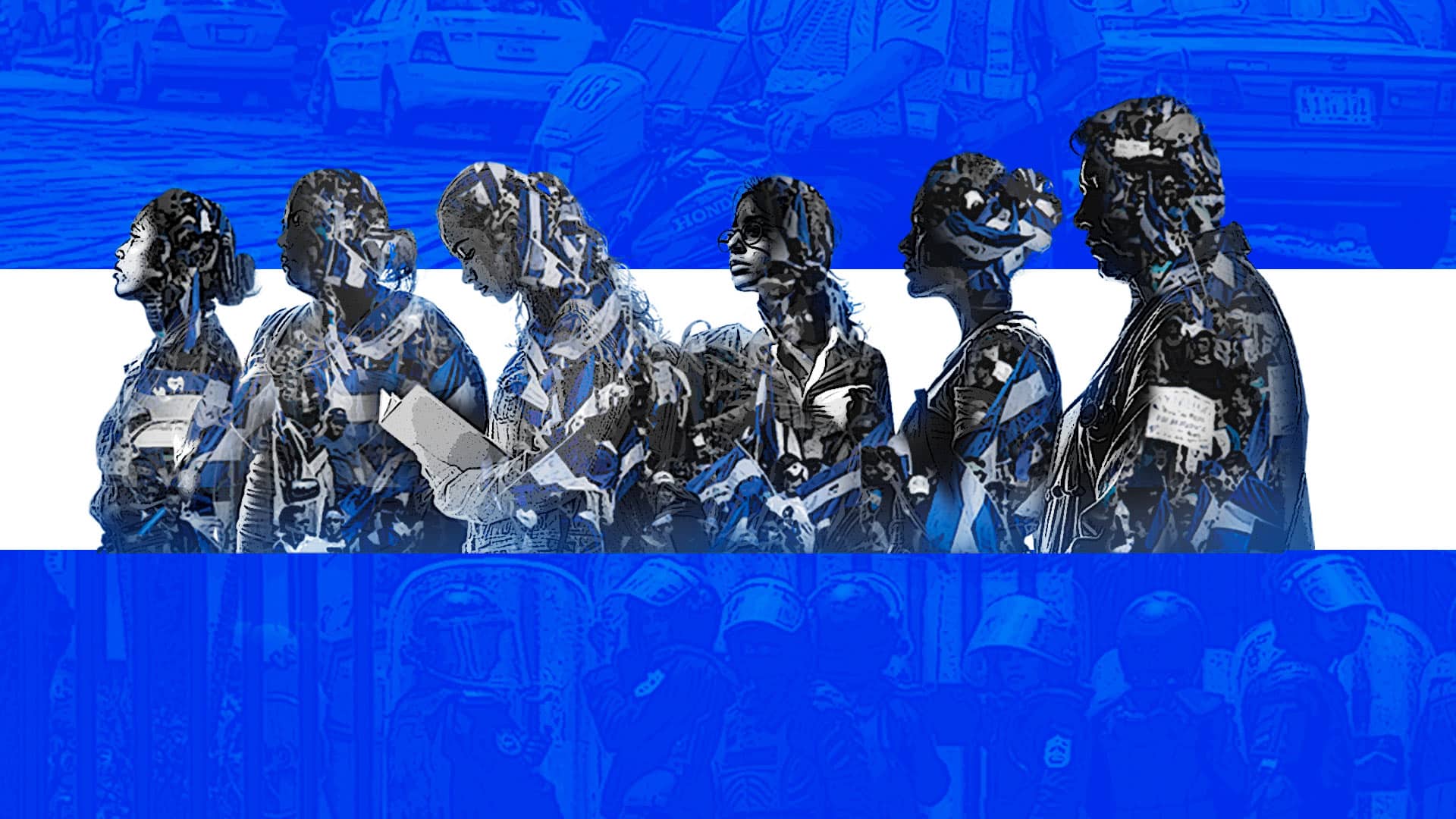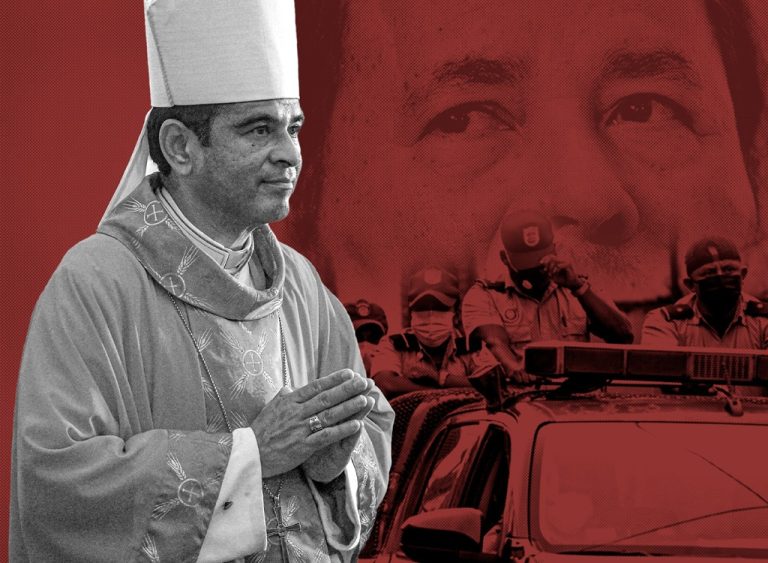21 de septiembre 2022

Six Years With April in Tow: Life Under Nicaragua's New 'Normal'

PUBLICIDAD 1M
PUBLICIDAD 4D
PUBLICIDAD 5D
The bishop of Matagalpa remains under an alleged “investigation”, while the Vatican seeks a dialogue with the Nicaraguan Government

The bishop of the Diocese of Matagalpa and apostolic administrator of the Diocese of Estelí, Monsignor Rolando José Álvarez, a critic of the regime of Daniel Ortega, was taken from the Episcopal Curia of Matagalpa one month ago on September 19. He was transferred by force to his family's house in Managua, where he continues his house arrest imposed by the regime last August 5.
Monsignor Alvarez is allegedly being “investigated” by the regime for attempting to “organize violent groups”, allegedly “with the purpose of destabilizing the State of Nicaragua and attacking the constitutional authorities”. Despite the seriousness of the accusations, the authorities have not offered any evidence against the religious leader.
Since Alvarez was transferred to Managua he has only been seen by his closest relatives and by Cardinal Leopoldo Brenes, who last September 4 declared to Efe news agency that, in spite of these conditions, the bishop is well.
“I have been speaking to him (...) He told me that he is in good health. I found him to be in better spirits. I had a good time talking with him. And he asks us to continue praying for him and that hopefully, the Holy Spirit will enlighten us so that we can soon solve this conflict”, he said.
Cardinal Brenes also explained that Bishop Alvarez “is being well-cared for. His family goes twice a day to visit him. In the morning and in the afternoon”, and that “his cousin, who was the one who took care of his house, cleaned and cooked for him the days he was in Managua, continues to cook for him”, he said.
Like Monsignor Alvarez, the regime of Ortega and Rosario Murillo keeps seven priests, two seminarians, and a committed layman imprisoned. In addition, last March it expelled from the country the apostolic nuncio Waldemar Stanislaw Sommertag and months later, in July, 18 missionaries of Charity. He also canceled a dozen media belonging to the Church and forced several priests into exile.
Faced with the house arrest of Monsignor Alvarez and the escalating repression against the Catholic Church, Pope Francis affirmed on September 15 that "there is a dialogue with Nicaragua" and that the Vatican has spoken with the Ortega government.
“In Nicaragua the news is clear, there is dialogue, there have been talks with the Government. There is dialogue, but this does not mean that everything the government does is approved or disapproved,” the pontiff said during a press conference aboard the papal plane on his return to Rome after his trip to Kazakhstan.
The Pope assured that “there are problems and they have to be solved” and wished that the Missionaries of Charity, a congregation founded by Mother Teresa of Calcutta and outlawed in Nicaragua last July, could return to the country. The 18 missionaries who were kicked out of the country “are revolutionaries, but revolutionaries of the Gospel and women like them are needed,” Francis said.
“There are things that are not understood, that are not assimilated, but we must never stop the dialogue," added the pope, after describing the expulsion of Nuncio Waldemar Stanislaw Sommertag from Nicaragua as “incomprehensible”, and stating he is “a good man who has now been appointed in another country.”
Regarding the house arrest of Bishop Alvarez, the pope said he has not spoken with him. The Ortega regime, however, has not pronounced itself on Pope Francis' offer, so analysts have pointed out that “there is no genuine interest” to solve things.
The international community has widely condemned the event. Hours before Francisco's statements, the members of the European Parliament (EP) approved a resolution on the situation in Nicaragua, “in particular the detention of Bishop Rolando Álvarez”, in which - among other things - they demand the immediate release of the religious leader and all political prisoners of the Ortega and Murillo regime.
Currently, the Ortega and Murillo regime holds 205 political prisoners, most of them are held in subhuman conditions in the prisons of El Chipote and La Modelo, in Managua, according to the Mechanism for the Recognition of Political Prisoners.
In the document, the MEPs call on the Nicaraguan regime to “immediately and unconditionally” release all political prisoners, including Bishop Alvarez, and “to annul all judicial proceedings against them and the sentences imposed”.
During the debate prior to the EP vote, MEP Željana Zovko, from the Group of the European People's Party, explained that Monsignor Alvarez is “a person who speaks clearly calling for freedom and democracy in his country”, for which the ruling regime in Nicaragua persecutes him.
For MEP Isabel Santos, of the Group of the Progressive Alliance of Socialists and Democrats in the European Parliament, the Ortega-Murillo regime's attacks on the Catholic Church are “a reflection of the disturbing attack on social freedoms and the state of terror experienced by Nicaraguans.”
The arrest of Monsignor Alvarez “is one more case” on the list of violations of the fundamental rights of Nicaraguans, warned MEP Santos. It is for this reason that she demanded the release of the bishop and all political prisoners “quickly” and “without any conditions”, she emphasized.
In the same vein, MEP José Ramón Bauzá, of the Renovar Europa Group, warned that we are “facing the darkest summer of the Church in Nicaragua”. The arrest of Monsignor Alvarez and eight other priests is “a dastardly deed that only dictators like Ortega can execute,” he commented.
The resolution of the European Parliament “cannot remain exclusively a denunciation of the repression against the Church. Bishop Alvarez represents many more,” Bauzá emphasized.
So far, neither the Public Ministry nor the National Police has publicly presented a formal accusation against Bishop Alvarez, who will soon be 56 years old and who is the first bishop to be arrested since Ortega returned to power in Nicaragua in 2007.
“The Ortega Murillo regime is not going to divert our attention. What are they doing with the priests, seminarians and the cameraman kidnapped in El Chipote?” asked the Nicaraguan Center for Human Rights (Cenidh) weeks ago.
The arrest of Bishop Alvarez is the most recent chapter of a particularly turbulent year for the Catholic Church in Nicaragua with the Ortega government, who has labeled the religious as “coup perpetrators” and “terrorists”.
The police have also forcibly entered and raided a parish, prevented parishioners from receiving the Eucharist inside the church, and besieged other priests in their churches. Likewise, the archdiocese of Managua was forbidden from celebrating the procession with the pilgrim image of the Virgin of Fatima.
This article was originally published in Spanish in Confidencial and translated by our staff.
Archivado como:
PUBLICIDAD 3M
Confidencial es un diario digital nicaragüense, de formato multimedia, fundado por Carlos F. Chamorro en junio de 1996. Inició como un semanario impreso y hoy es un medio de referencia regional con información, análisis, entrevistas, perfiles, reportajes e investigaciones sobre Nicaragua, informando desde el exilio por la persecución política de la dictadura de Daniel Ortega y Rosario Murillo.
PUBLICIDAD 3D